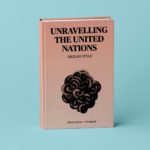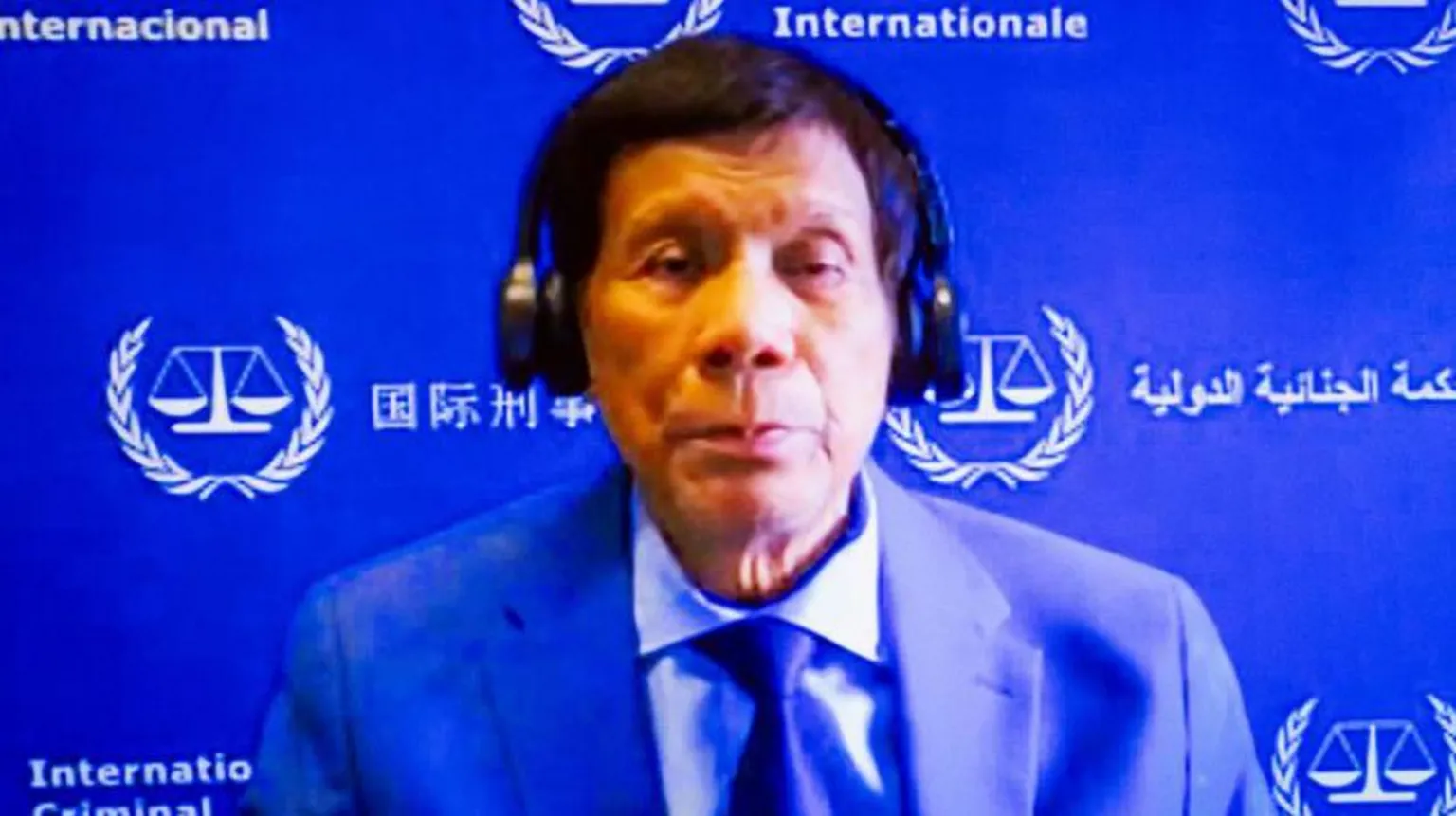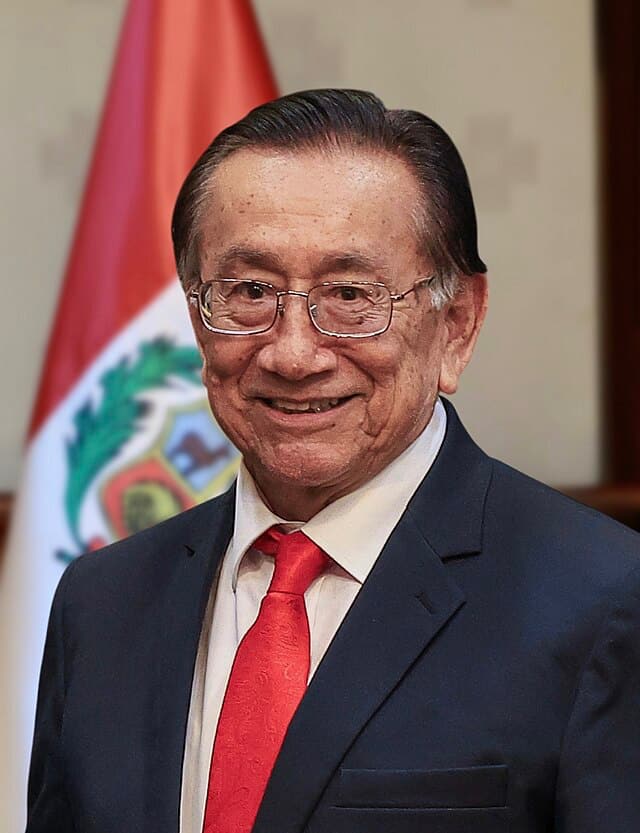Whose Justice?
Justice is not a relative term, but for much of our history we have manipulated it to such an extent that we have created a parallel sort of justice. More often than not, human justice is just a sinister doppelgänger of justice in its purest form. Human justice depends on laws, and as we all know, laws are biased. In this issue of The Gordian, we discuss the differences between the International Court of Justice and the International Criminal Court and test their fairness, validity and integrity. We will also introduce you to a new series within magazine titled "UN in Focus". This issue contains exclusive reports by Jonna Lappalainen, Ayten Aydin and Carla Pietrobattista.
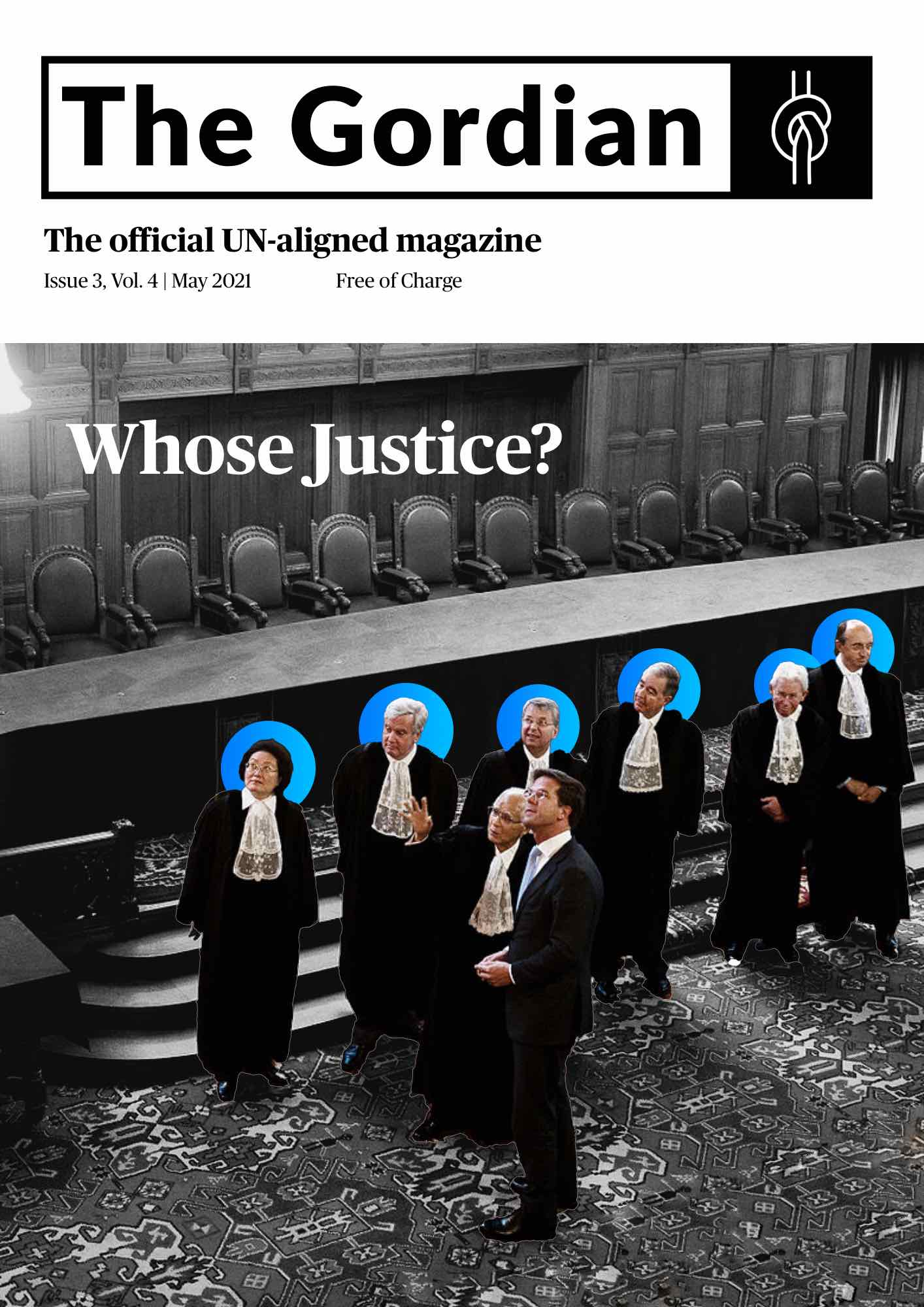
Updates to the UN-aligned manifesto that you need to review
By Ariana Yekrangi
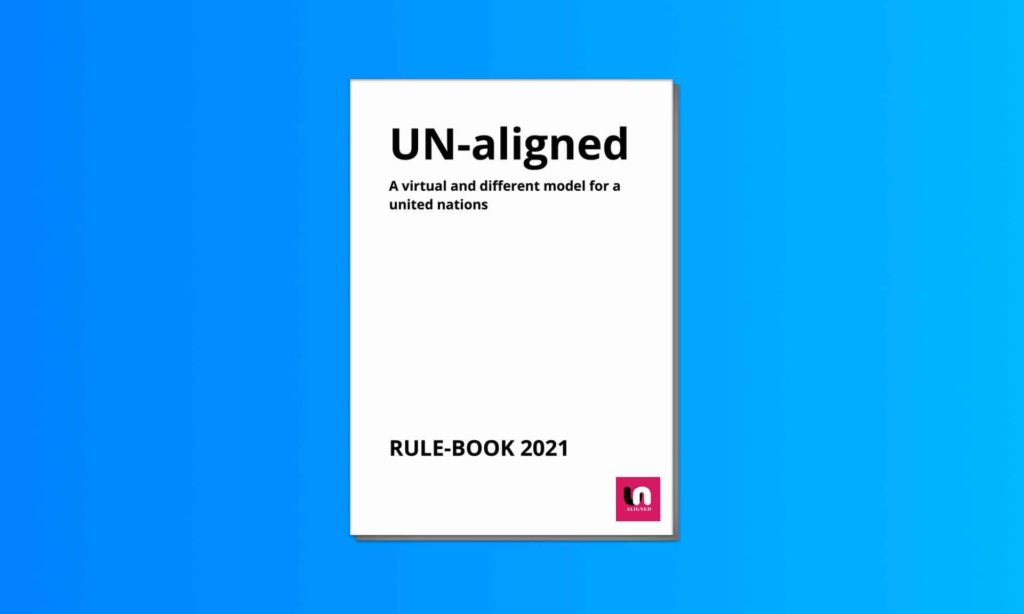
On May 2021, UN-aligned board decided to update the language around some of the items in its manifesto. You can review all the edits here.
We believe the flexible roadmap of UN-aligned’s manifesto presents a safe trajectory for a united world, so as UN-aligned grows we are always seeking to refine, clarify and improve our goals and missions. The following changes have been made to the UN-aligned manifesto as of May 2021.
Updates regarding our Mission statement
We refined the language around our mission statement, namely regarding our vision to create an alternative to the United Nations.
The purpose of UN-aligned is threefold:
- To create a virtual and a different model for a united nations that would put humanity before nationality and planet before greed.
- To promote human rights, animal welfare and environmental protection as well as the creation of political parties that would reflect the principles of UN-aligned.
- To create a platform for discussion and dissemination of knowledge.
Updates to the creation of UN-aligned Parishes
UN-aligned Parishes are simply membership hubs created by a self-appointed person committed to the principles of UN-aligned. As of now, Parishes may register with the central office as soon as they have 20 or more adherents with full membership.
Updates regarding The International Political Party
The principles of the party will be roughly the same as the articles (1-23) with the added goal of a federal partnership consisting of all states. Details and other agendas will be added according to regional needs in the spirit of the said articles. Once a national branch has enough members and resources to warrant the formation of a political party, its endeavours will be supported by the whole organisation. Learn more about the UN-aligned as an International Political Party
The addition of a new article into the UN-aligned manifesto
We added a new article to our manifesto, let us introduce you to article 23.
“Article 23: Companies and multinational corporations must be regulated fairly.”
Reasoning
Corporations often get away with murder. Many laws allow them the pillage and exploit, without even giving anything back to the communities they devastate. Often, they pollute to murderous extents and are happy to factor in the fines that would ensue. The pharmaceutical and fuel industries, for example, are notorious for shattering lives and environments, while corrupt governments are happy to let them, as they ignore the plight of masses of their own people. Rigorous legislation must be in place, both at national and international level, to protect people and the environment.
The political party will commit to:
- changing national laws, and working to improve international ones, in order to protect people, indigenous communities and the environment from companies that ignore their corporate social responsibilities by putting profit before decency
- ensuring that the self-regulation of companies is never a replacement for external monitoring that aims to protect in a thorough, informed and effective manner
- making people responsible for crimes they commit in the name of their company, or the company commits in a cloud of veiled responsibility
- Legislating so that all companies contribute to the wellbeing of the communities they are operating in.
UN in Focus: holding the United Nations accountable to UN-aligned’s standards
By Ariana Yekrangi
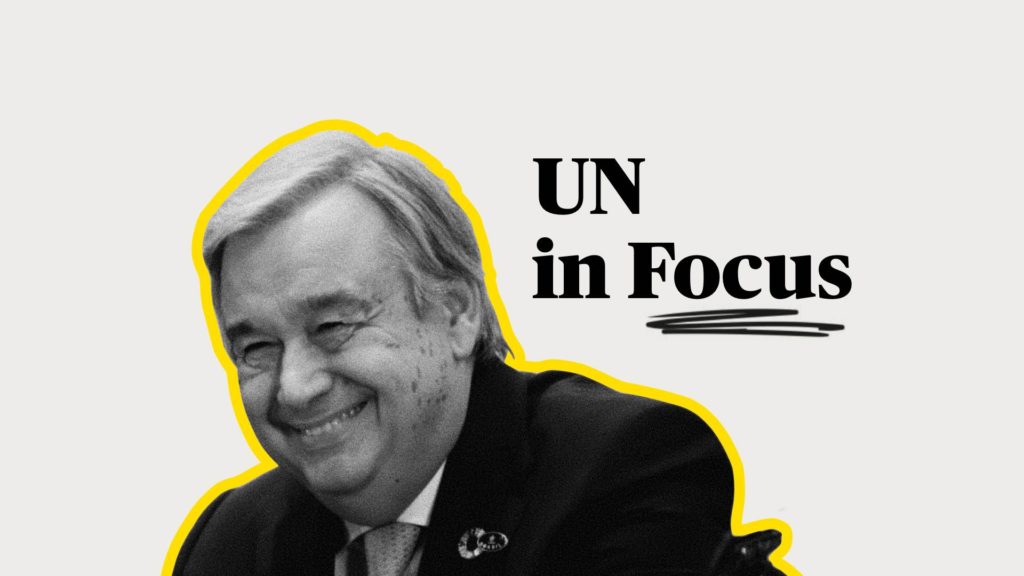
UN in Focus will bring peace, human rights, solidarity and the environment to the top of the UN agenda. Photo by UN-aligned design team
The United Nations is not just any organisation. It is meant to be the organisation par excellence, it is meant to represent humankind. However, the UN spreads itself so thinly it is no wonder that it struggles to meet many of its commitments.
We would like to introduce you to a new feature in The Gordian Magazine. Every month an exclusive piece will highlight the good, bad and the ugly of the events in the UN.
Although organisations like the UN Watch already monitor the activities of the United Nations, they do so by the yardstick of the UN’s “own charter’’. Holding an organisation that lacks any trace of LGBTQ+ rights in its literature, an organisation that does not hold particularly high values for human rights, an organisation shackled by bullying superpowers is not sufficient nor beneficial.
This is where UN in Focus will shine. We will hold the United Nations accountable to UN-aligned’s standards.
This series will expose the hypocrisies of self-serving members of the UN and will bring peace, human rights, solidarity and the environment once again to the top of the UN agenda. The first feature of this series will be published in June.
The ICJ & the ICC: A closer look at the justice doppelgänger
By Adrian Liberto
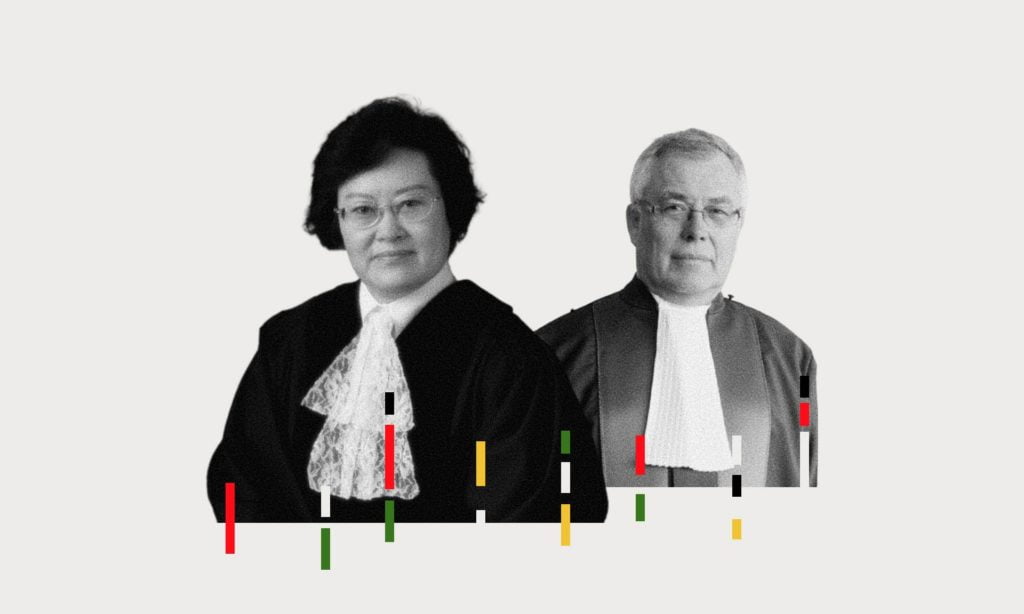
President of ICC Judge Piotr Hofmański and Xue Hanqin vice-president of the ICJ
Justice is not a relative term, but for much of our history we have manipulated it to such an extent that we have created a parallel sort of justice. More often than not, human justice is just a sinister doppelgänger of justice in its purest form. This is because human justice depends on laws, and as we all know, laws are biased. The justice of the Inquisition, a sharia court or the sham courts of dictatorial regimes are based on very different laws and therefore profess their own unique brands of justice. The one main thing that they do have in common, though, is that they are self-serving. Being tried by a self-serving court is not justice, but rather, quite the opposite, namely, injustice or anti-justice. However, laws are not the only factor influencing justice, as the mechanisms that are in place to apply these laws also play a crucial part in the administration of justice.
International Law
In this article I would like to focus on the International Court of Justice (ICJ) and the International Criminal Court (ICC). Both are contingent on international law and the first test of their fairness lies in the validity and integrity of these laws. The main sources of international law are, according to the Statute of the ICJ as:
- International treaties and conventions;
- International custom as derived from the “general practice” of states; and
- General legal principles “recognized by civilized nations”.
These laws are also influenced by political and legal theories as well as expertise and interpretations offered by international law scholars. Many reflect the 1920 Statutes of the Permanent Court of International Justice, as part of the Covenant of the League of Nations. Indeed, it would take several experts to evaluate these effectively, nevertheless, one does not need to be an authority in this respect to identify some of the glaring weaknesses.
Where are the international laws to prevent ecocide or animal exploitation, for instance? Or where is the law that forces the 70 plus nations that discriminate against LGBTQ+ people to stop doing so? The United Nations argues that its Declaration of Human Rights is “unequivocal” when it claims that: “All human beings are born free and equal in dignity and rights.” This is nonsense! How else could over a third of its Member States get away with criminalising homosexual acts?
As for the mandates, mechanisms and functions of the ICJ and the ICC, they are very different, as are their successes and failures.
The International Court of Justice (ICJ)
Unravelling the UN
(This section on the ICJ is taken from my book Unravelling the United Nations)
The International Court of Justice (ICJ) is “the principal judicial organ of the United Nations.” It took over from and “is based upon the Statute of the Permanent Court of International Justice” that was established by the League of Nations in 1920. “The Court’s role is to settle, in accordance with international law, legal disputes submitted to it by States and to give advisory opinions on legal questions referred to it by authorized United Nations organs and specialized agencies.
The Court is composed of 15 judges, who are elected for terms of office of nine years by the United Nations General Assembly and the Security Council. It is assisted by a Registry, its administrative organ. Its official languages are English and French.”
Thus, the ICJ has two main roles, namely: settling disputes that are presented to it by the countries that are involved in conflict (contentious cases) and advising on issues referred to it through UN channels (advisory proceedings). It is therefore very different from the International Criminal Court [ICC], which only deals with individuals…
The ICJ can only adjudicate when all the States involved in the case in question have accepted the court’s jurisdiction. This may be done in three ways:
- “By entering into a special agreement to submit the dispute to the Court;
- By virtue of a jurisdictional clause, i.e., typically, when they are parties to a treaty containing a provision whereby, in the event of a dispute of a given type or disagreement over the interpretation or application of the treaty, one of them may refer the dispute to the Court;
- Through the reciprocal effect of declarations made by them under the Statute, whereby each has accepted the jurisdiction of the Court as compulsory in the event of a dispute with another State having made a similar declaration. A number of these declarations, which must be deposited with the United Nations Secretary-General, contain reservations excluding certain categories of dispute.”
After a case has been submitted to the judgement of the court, the States involved are expected to abide by its decision. Should a party wish to ignore the rulings of the court, the other party may call on the Security Council to intervene:
“If any party to a case fails to perform the obligations incumbent upon it under a judgment rendered by the Court, the other party may have recourse to the Security Council, which may, if it deems necessary, make recommendations or decide upon measures to be taken to give effect to the judgment.”
Permanent members fo the Security Council, can easily dismiss the decisions ICJ
The Security Council, however, may also choose to dismiss the decisions of the court through one or more of its permanent members, even if these members had previously submitted to its jurisdiction. This happened spectacularly in 1986, with the case of Nicaragua versus the United States. Nicaragua had filed a case against the USA accusing it of mining its ports and of supporting the Contras in their attack on the legitimate government of Nicaragua. Owing to the USA’s previous acceptance of the Court with regards to the jurisdiction over such disputes, the suit was considered valid, despite the USA arguing against this. The ICJ had the final word because its Statute specifies that in case of doubt, it is up to the ICJ to decide whether its jurisdiction was lawful or not.
The US withdrew its previous commitments that were applicable to the case, but the ruling went ahead. The USA was ordered to terminate its aggression against Nicaragua and to pay reparations. The US refused to comply and “vetoed” the ruling on 28 October 1986. Two other permanent members of the Security Council – the United Kingdom and France – abstained, as did Thailand. A few days later, on 3 November, the General Assembly voted by a majority of 94 to 3 on a resolution (A/RES/41/31) calling for the USA to respect the ruling. Only El Salvador and Israel joined the USA in voting against the resolution.
The UN list of ICJ rulings does not even include the Nicaragua versus the United States case. This is because, in 1978, the ICJ decided that only cases that were accepted by responding parties should be included. As such, it only publicises its successes. The same does not apply for advisory proceedings, however, and the Court’s opinions are listed in these cases, as the recent conclusions on the issue concerning the Chagos Archipelago indicates.
The Chagos Archipelago, the largest island of which is Diego Garcia, remained under British control when Mauritius received its independence in 1965. The British proceeded to change its name to the British Indian Ocean Territory [BIOT], deport all of its residents (about 1,500 people) and set up a US/UK military base.
The UK was “under an obligation to bring to an end its administration of the Chagos Archipelago”
On 25 February 2019, the ICJ found that “the process of decolonisation of Mauritius was not lawfully completed when that country acceded to independence”. It therefore concluded that the United Kingdom was “under an obligation to bring to an end its administration of the Chagos Archipelago as rapidly as possible.” The UK Government, however, made it immediately clear that it would disregard the advisory verdict. Soon after the decision, Karen Pierce, the UK Permanent Representative to the UN, declared that: “the United Kingdom has no doubt about our sovereignty over British Indian Ocean Territory”.
These affairs do not only exemplify how self-interest can take precedence over justice; they also highlight how UN institutions can be undermined by the very nations that helped create them. They also expose the weakness of the Court, in as much as it depends on the goodwill and the willingness to comply of all the parties involved.
The International Criminal Court (ICC)
The ICC is very different from the ICJ, although it is easy enough to confuse the two courts. The fact that both are headquartered in The Hague, in the Netherlands, has added to the confusion. The ICC was set up by the Rome Statute in 1998 and only began operations in 2002. Its purpose is specifically to judge individuals accused of committing serious crimes, namely: genocide, crimes against humanity, war crimes, crimes of aggression and offences against the administration of justice. While all UN member States “are ipso facto parties to the Statute” of the ICJ, the ICC is not an organ of the UN, nor is it universally recognised. Nevertheless, the UN Security Council is one of the authorities that can trigger a trial; the others being a State party and the actual Prosecutor.
When it comes to defining specific crimes, the ICC is unambiguous, which is not surprising considering the extent of violence involved. In all, however, the ICC has only managed to indict 45 people, although most are tried in absentia and never brought to justice. Many cases are also dropped due to a lack of sufficient evidence. Successful convictions include the first in 2006, that of Thomas Lubanga Dyilo for war crimes committed in the Democratic Republic of the Congo and the last, Ahmad al-Faqi al-Mahdi (in 2016), a Tuareg Islamist responsible of war crimes in Mali.
One of the main problems is that State cooperation is necessary for the ICC to mount successful cases. Without this, the court would face several problems, including reaching the convict and the necessary witnesses. Cases are therefore often cherry-picked, with many centring around Africa. Another problem is that when people in power are convicted in absentia, they then become desperate to cling on to power at all costs in order to avoid being extradited to face justice, as was the case with Omar al-Bashir of Sudan. Most concerning is the fact that investigations can take decades to conclude. This is obscene. No wonder so many of those indicted die before their case is concluded.
In 2012, Jon Silverman, writing for the BBC, highlighted the main issue:
“The International Criminal Court (ICC) currently has an annual budget of over $140m (£90m) and 766 staff. Since its inception, its estimated expenditure has been around $900m (£600m). With only one completed trial to show for a decade of effort and expenditure, the ICC has faced regular criticism that it sucks in investment with few results to show for it.”
The situation is no better today. The ICC’s budget for 2021 is €148,259,000, and with about 14 ongoing investigations, that is over €10.5 million a case. Moreover, six of those cases date back to over a decade since the investigation opened. The overall cost per case is therefore a good deal higher. One may argue that the existence of the court itself serves as a deterrent and that its value should therefore not be judged by the number of investigations alone. However, with so few success stories to speak about, it is highly unlikely that the ICC constitutes much of a deterrent.
International Justice: Are we better off without the ICJ and the ICC?
On the one hand, until we have a better system to replace them, the answer is ‘no’; but on the other, if they lead us to sit back complacently thinking that they are the solution to international justice, the answer is ‘yes’. Something better is clearly needed: a justice system that is founded on clear ethical principles that do not need decades to unravel and effective mechanisms that cannot be undermined by Nation States.
In the next issue of The Gordian, I will offer some suggestions on what this revised view of international justice could look like.
- If you would like to contribute to that article, please contact me at: adrian.liberto[at]un-aligned.org.
The Human Anthropological Transmutation: Bridging thoughts and new concepts
By Ayten Aydin
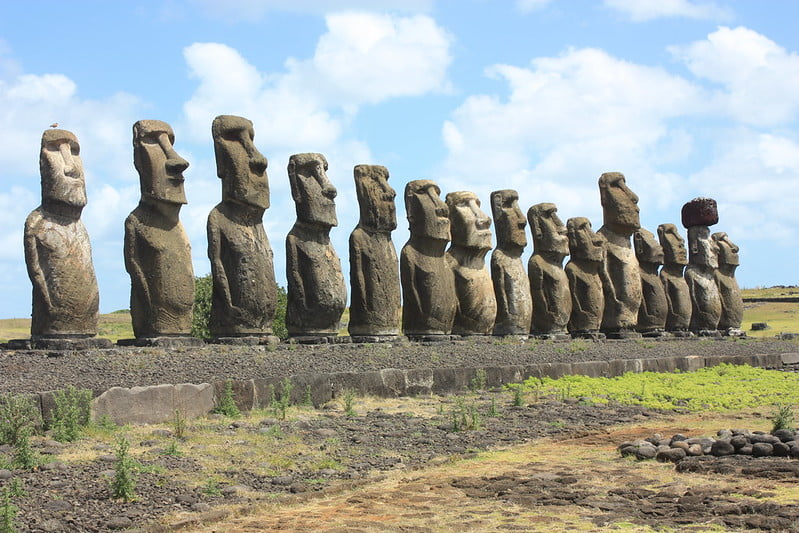
Easter Island, Ahu Tongariki. Photo by Arian Zwegers/Flickr
In the Palaeozoic era, an order of molluscs with red shells, called ammonites, had spread through all the sea since they had the ability not just to live underwater, but also to expel water from their shell and thus rise and descend. Their success with respect to other forms of life led them to reproduce until they saturated their environment and became extinct. The reason is the uncontainable growth of the species.
The large stone statues that we see today on Easter Island are the visible trace of the passage of a population that died out following the total deforestation of the land. The source of life on the island was in fact the very trees that were used for the transport and erection of those totems, symbols of political and religious power.
The reason for the extinction is arguably due to the iniquitous exploitation of nature for the construction of symbols of artifice. In today’s world, these two factors are combined: the unbounded reproduction of human beings and the consumption of our natural resources for the progressive growth of the artificial product. Thus, the prospect is that of a growing risk of the extinction of our species.
In the past, the family was made up of members of all the different generations and the children, who were raised in part by their grandparents. The network was fundamental as a workforce focused on an agricultural and artisanal economy. The Industrial Revolution, from the 19th century onwards, has broken down the extended family system by offering each member economic independence. The resulting prosperity has created a situation of alienation in family and generational ties. We are now faced with the need to build new relationships between people of different ages, while preserving the autonomy of individuals.
The experience of co-housing, which originated in Scandinavia, could be a significant example of such interaction. This is based on structures in which a number of people or families live in a residential community with common facilities. The independence of the private home remains guaranteed by personal rooms, but these are supplemented by shared spaces and resources like a library, living room, kitchen, household appliances, workshops gyms, guestrooms, vegetable gardens, cars, nursery facilities, gardens and the individual skills of the inhabitants.
These communities are not based on ideological or religious principles, but on the desire to recreate a lost sociability and to live in a way that has a sustainable environmental footprint and in which running costs can be shared, reducing the expense of daily life. In these places, the old and the young are able to share their time, knowledge and ideas. In such places, creativity can flourish and art, in its widest sense, can be a means of setting in motion common and unifying experiences.
Michelangelo Pistoletto, attaches, among all the areas highlighted above, the highest importance to education. With his words:
“Every society brings up children according to its own ways and customs, but at this moment it is precisely ‘ways and customs’ that have to change, and to do so profoundly. Devoting ourselves to education of children means effecting, through their forming , our own transformation as well. The attitude of the individual towards him or herself and towards the community is shaped in the first 15 years of life.”
The Information and Communication Age, now fully in force, will make a great difference in this area. Although of relatively recent origins, the history of information technology has gone through a change equivalent to the one that led from the time of mammoths to today’s human beings. The scientific view of education is certainly not limited to the utilisation of technology. Let’s take music, for example: it can be transposed mathematically and in this mathematics, even the freest and most complex expression of the emotions and imagination is organised and expressed. The imagination leads into the universe of possibilities. Childhood fantasy is a continual investigation of the possible.
- This is the last article in the series by Ayten Aydin which she has selected for The Gordian from her book: Ascending to Truth Way of Converging Minds. The book is available on Amazon and selected bookshops*.*
700 years of Dante: The freedom to choose
By Carla Pietrobattista
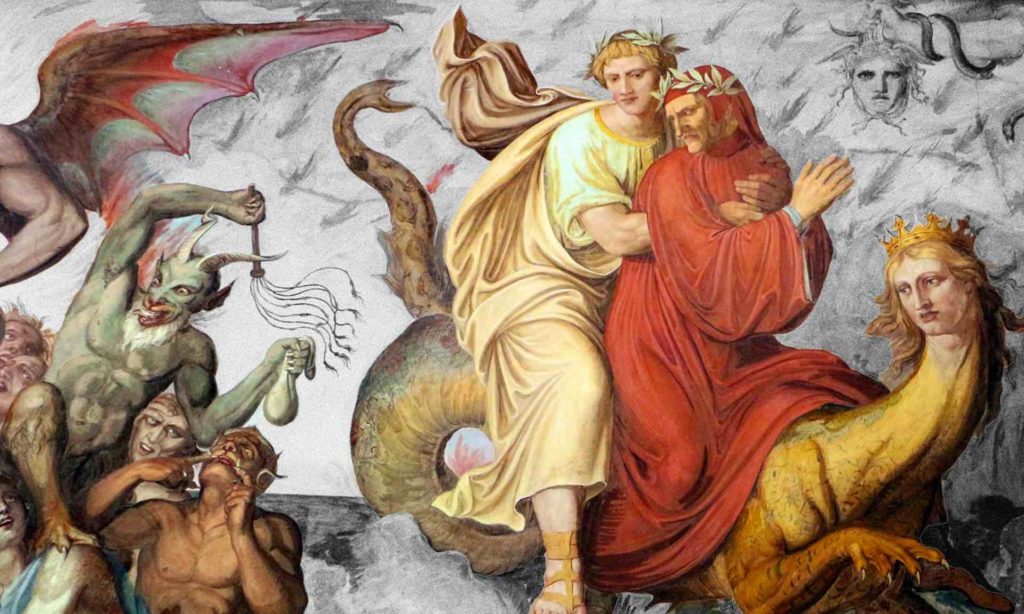
Joseph Anton Koch – Inferno (1825-28)
The following article is taken from a speech given by Carla Pietrobattista on Dante Day, March 25, which is traditionally held as the day the “divine poet” started his masterpiece, the Divine Comedy. 2021 also marks the 700th anniversary of Dante’s death. The event was presided by the Mayor of Magliano dei Marsi, Pasqualino di Cristofano. Ms. Pietrobattista will also be collaborating on the new Art Section of The Gordian, which will start next month.
Picking up the gauntlet
What happens in real life when some encounters change you and remain in your heart, also happens in art; sometimes you get the feeling that some works have been made specifically for us, to make our souls vibrate. It is for this reason that when I was asked to talk about Dante I immediately said yes, because there was a moment in my life when I felt that he had touched my heart and has never left it since. I consider this immediate and spontaneous acceptance, more of an emotional than a rational response, for a number of reasons.
First of all, I had only three days to transform a set of personal thoughts and feelings into something concrete. Secondly, I have always had the conviction that talking about Dante would be difficult, even risky, because many scholars and experts over the centuries have done so with greater knowledge and skills than mine. Finally, having studied Dante both in high school and at university could have led me to simply relay well-known and commonplace concepts.
I realized that I not only could, but I absolutely had to talk about Dante
My love for Dante blossomed at the University of Perugia, where I was lucky enough to follow the lectures of one of the greatest authorities on Dante. Thanks to his insight, I became curious to know more about Dante the person. This changed my perspective, so when I received the invitation, I realized that I not only could, but I absolutely had to talk about Dante.
Dante’s universality
Having made these necessary clarifications, I would like to start talking about the great poet with a question that in my opinion is at the basis of every discourse that concerns him, namely: why is it necessary to know Dante? Especially now that we are experiencing the most dramatic historical moment since the Second World War, why should we waste time talking about a man who died 700 years ago?
In my opinion, Dante gives us the answer directly in the first lines of his most important work, the ‘Commedia’, when he affirms, without the slightest need to hide his weakness and fragility, that he was lost:
"In the midway of this our mortal life,I found me in a gloomy wood, astrayGone from the path direct: and e’en to tellIt were no easy task, how savage wildThat forest, how robust and rough its growth,Which to remember only, my dismayRenews, in bitterness not far from death.Yet to discourse of what there good befel,All else will I relate discover’d there.”(Inferno canto I, verses. 1 to 9 - Tr. Rev. H. F. Cary ).
This is why it is now more necessary than ever to get closer to Dante. One must not remember him in a sterile and obsequious way, or because this year marks the 700th anniversary of his death, but because Dante was able to speak to everyone, not only to his contemporaries, of how one can and must cross the darkest of woods to return to see the stars.
In order to understand what role Dante can play in our life, it is necessary to know him in a less historical and clinical way than we are used to and delineate his personality as much as his historicity.
It is precisely in this direction that I would like to try to move in order to transmit and share as much as possible the emotions I felt when I understood Dante’s greatness as a man, a step that turned out to be fundamental for my understanding of Dante’s work as a poet.
The man and his name
Durante, son of Alighiero, or Alaghiero di Bellincione and his first wife Bella Degli Amati, was born in Florence in May 1265 from a family with ties to ancient Guelph nobility. The name Durante however, does not identify him, but his diminutive Dante, does. I have always liked to toy with the name, starting from the Latin affirmation “Nomen Omen”; the ancient Romans believed that a person’s destiny was written in their name. In the case of Dante, I believe that this is the case, his name which originates from a verbal form, is the present participle of the verb to give, that is, he who gives and Dante has given, has given each of us the greatest masterpiece of literature of all times, the Divine Comedy. The now universal knowledge of Dante’s name means that it is not necessary to specify his surname, as Dante is recognised everywhere. I am one of the many Carlas; Dante however, is unique. Dante is identified and associated not only with his works, but also with his person of which we were able to get an idea thanks to the description transmitted to us by Boccaccio, one of the first scholars of the Divine Comedy and the first to define it as such.
A son of Florence
Surely another element that over time has become Dante’s identifier is the city of Florence with which a sort of duality has formed: Dante \ Florence - Florence \ Dante. Identifying Dante with his city is one of the greatest clichés I could propose, but among the many it is the one that more than others has a solid foundation. Dante would not have been Dante without the unique political and cultural vivacity that Florence, the future cradle of the Renaissance, could offer.
All my ills and inconveniences found their cause in the unfortunate events of my priory
Florence, the pain and delight of the supreme poet, is where Dante began his political career in 1295 as prior from June 15 to August 15 of 1300. It is precisely in this period that the unfortunate events of the poet originated, as he himself affirms: “All my ills and inconveniences found their cause in the unfortunate events of my priory”. In fact, it was during his priory period that the well-known Florentine conflict between the Cerchi family and that of the Donati took place. This resulted in the split between the Guelphs into the White Guelphs and the Black Guelphs. Dante, a well-known white Guelph, suffered at the hands of the black Guelphs who could count on the support of the Pope and Charles of Valois. In this context, he was found guilty of “baratteria”, that is, of illicit gains.The poet was sentenced in absentia to the payment of a fine, to two years of confinement and to the interdiction of public office.
Dante, who had been able to interpret the evolution of events and the danger he ran, was not in Florence at the time of his sentence and never returned there. Precisely for this reason he never paid the fine and the sentence was transformed into confiscation of assets and death at the stake if he returned to his city. Thus was born the figure of the exiled Florentine Dante, far from his city and his loved ones, forced to experience how hard it was to climb the stairs of others, he who is described by Boccaccio as “melancholy and pensive and with a very high and disdainful soul."
The Divine Comedy
The distance from home and the humiliation of being at the service of other gentlemen created the fertile ground for the birth of a text called the Divine Comedy. ‘Comedy’, because it was characterised by a tragic beginning but a happy ending; ‘Divine’ for its composition characteristics. It is within this work that Dante proved to be not only a poet, but also an attentive and refined man of culture whose knowledge ranged from ancient literature to justice and from astronomy to mathematics. His genius was capable of enclosing an immense literary work in the mysticism of the Middle Ages, choosing the number three symbol of the trinity, and the number ten symbol of perfection. It is on these numbers that the construction of the entire opus is contained, which is written in triplets. The three canticles are divided into thirty-three cantos. To the total of ninety-nine, a sort of preface was added to reach the sublime perfection of one hundred, or ten times ten. Within his world so perfectly structured, the poet faced the most magnificent of travels, the journey par excellence for the man of the Middle Ages.
Inside Hell, Dante met souls whose actual bodies were still alive on earth
Dante, the ideal man of the Middle Ages, solid, consistent, but above all a man of faith was, within his work, the first and only common being to “walk” the roads of the three kingdoms of the afterlife. In so doing he was a witness of despair, hope and perfect joy. It is only thanks to what he says he saw that, at times, I can find the only possible explanation in the face of the manifestation of evil in its most absolute form. Dante in fact, inside the first kingdom, Hell, met souls whose actual bodies were still alive on earth, but inhabited by demons.
Master of time and space
Dante was not only supreme among poets, but he was also a man of exquisite ingenuity. He describes, with incredible modernity, his concept of Italy and Europe, openly or even simply, by naming historical events such as the battle of Tagliacozzo, the outcome of which determined the new balances that shaped Europe as we know it.
Besides being an expert in politics and culture, Dante understood man and all his feelings, sensitive to the point of making love eternal even when damned, as in the case of Paolo and Francesca. The complexity of the Divine Comedy, for me, is such as to lead me to define Dante as the master of time and space. Of time, because within Hell, Purgatory and Paradise, the environments in which his work takes place, he makes the condemnation or salvation of his characters eternal and yet contemporary. Of space, because he manages to give shape and dimension to the realms of the underworld which, together with souls, do not occupy space and have no form.
The freedom to choose
By not paying the fine Dante had chosen to remain true to himself, a coherent and integral intellectual, not a mercenary.
It may seem completely inappropriate on my part to pick the concept of freedom for my title, since Dante was not even free to return home without running the risk of being killed. Dante’s greatness and freedom, however, was precisely that of choosing between good and evil. By not paying the fine Dante had chosen to remain true to himself, a coherent and integral intellectual, not a mercenary. The same freedom to choose between good and evil has been enjoyed by all the characters of the Divine Comedy who, depending on their actions, are found in the various realms of the afterlife.
Dante had the courage that only free men can have when he found himself judging the souls of his work, making sure, however, never to present himself as God, putting those who according to him deserved Hell, starting from his enemies, without ever appearing as the deus ex machina within the scene, but as a spectator of the divine will: at times merciless, at times moved.
I believe he reached the highest freedom when, sure of his maturity and intellectual perfection, he felt ready and worthy to talk again about Beatrice, his only true love. As I have already said, Dante was a man of the Middle Ages, and as such he had not been free to live out his love for Beatrice. He had already been promised to Gemma Donati, while Beatrice had been betrothed to Simone dei Bardi.
In his world of perfect balance, woven by the wise hand of the One who can do what he wants, Beatrice can finally be close to Dante. She is in fact one of the three guides along the journey in the three kingdoms. We remember Virgil, symbol of reason in the kingdom of the underworld, where there could be no hope; Beatrice in purgatory, symbol of active love and prayer and therefore of hope; Saint Bernard, symbol of the contemplative love of those who see God in Paradise.
Freedom through knowledge
So let’s go back to the initial question, why is it necessary to know Dante? In my opinion we must know him to be free, because we can only be truly free through knowledge, we are all called to culture just as Dante tells us through Ulysses, in some way the poet’s own image: “/images/You were not made to live like brutes, but to follow virtue and knowledge “(Inferno cantoXXVI, verse 119).
Only thanks to knowledge can those ideals be born in us without which we will be condemned to run forever in a wild goose chase.
May Day protests: A celebration of spring or a day for activism? - in pictures
By Jonna Lappalainen
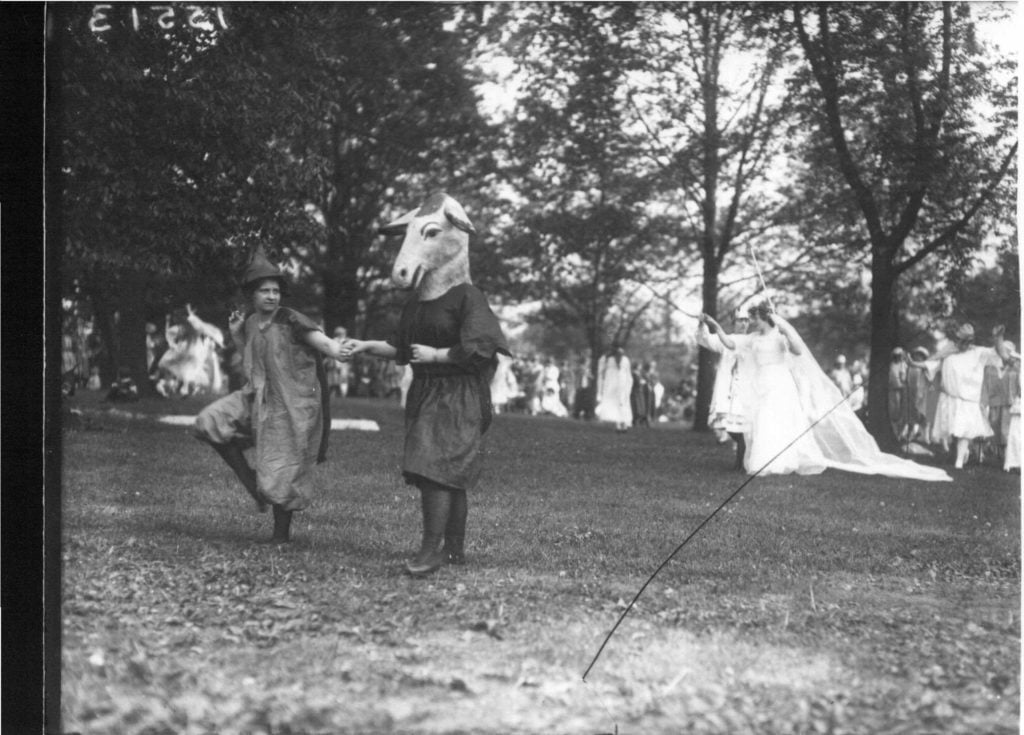
1916: Performers at Oxford College May Day celebration
May Day, Labour Day or International Workers´ Day has been celebrated in various ways throughout history. The Modern May Day is not only celebrated around the world by parades and parties, but also demonstrations and rallies in support of workers and human rights.
On May 1st, 1890, demonstrators called by the Second International gathered together to honour the martyrs of the Haymarket Affair in 1886. Since then, it has been more associated with the labour movement of the 20th century than with its roots as an ancient spring festival. This gallery guides you through some of the various different events that take place on May Day.
News in May 2021 you may have missed
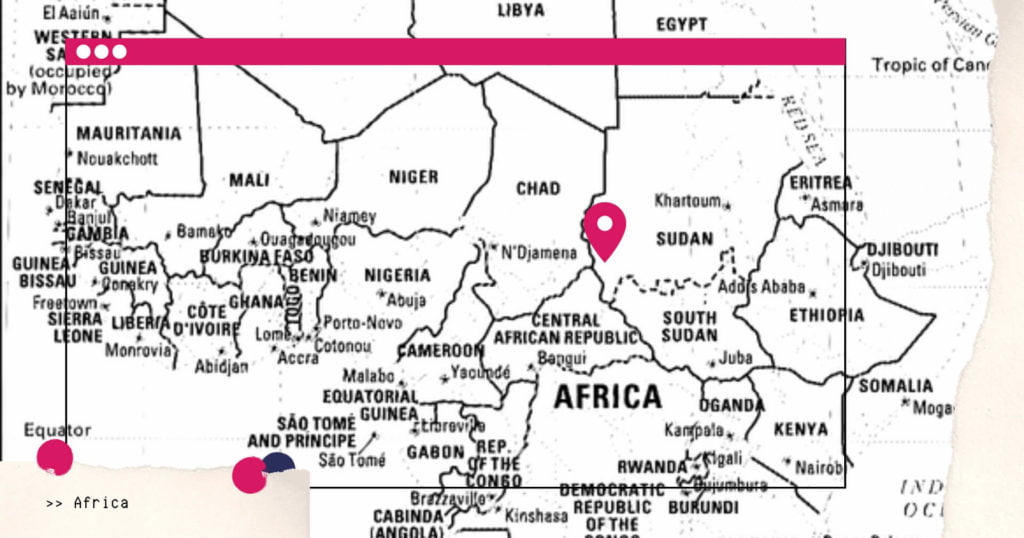
News reading made easy.
AFRICA
05.04.21: Sudan. An armed attack by militias in El Geneina, the capital of West Darfur State left at least 18 people dead and 54 others injured according to the Sudanese Doctors’ Committee.
07.04.08: DR Congo. The United Nation has raised the alarm stating that the country is heading towards a famine with up to 27 million people, a third of the population, likely to experience acute hunger. The situation is exacerbated by ongoing conflicts and the rising COVID-19 cases.
08.04.21: Egypt. The discovery of the Golden City of Luxor dating back over 3,000 years was announced. Archaeologists were excavating for a temple as they came across the well-preserved city.
10.04.21: Djibouti. President Ismail Omar Guelleh was re-elected for a fifth term with 98% of the vote. The main opposition parties boycotted the vote as they did not consider that they would be free and fair.
13.04.21: Niger. At least 20 small children have died in a fire at their nursery school in a poor district of the capital Niamey. The infants were trapped in straw-hut classrooms that went up in flames. The cause of the fire is yet to be determined.
14.04.21: Egypt: Twenty people died and others were injured in a collision between a bus and a truck in the Assiut governorate. Both vehicles burst into flames as a result of the accident.
19.04.21: Chad. Idris Deby has emerged as the winner of the presidential election with 79.3% of the vote. The despotic leader who had been in power since his military coup in 1990, has consistently suppressed any opposition, so his victory does not come as a surprise.
20.04.21: Chad. Just hours after his election victory, President Idris Deby was killed by rebel forces while visiting frontline troops. The constitution has been suspended and Deby’s son has replaced him.
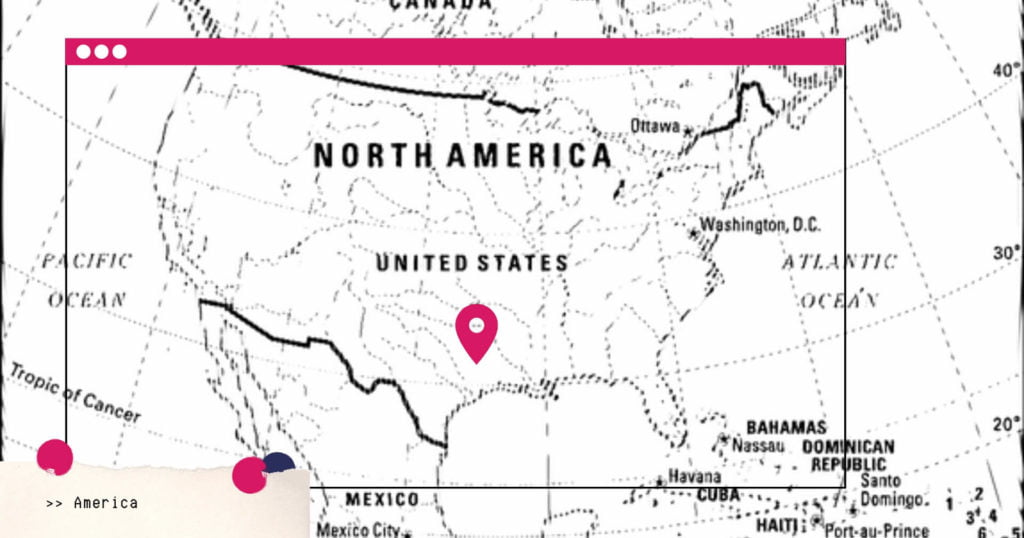
THE AMERICAS
01.04.21: USA/Honduras: Tony Hernández, the brother of Honduran President Juan Orlando Hernández, has been sentenced to life imprisonment by a US court for drug trafficking.
02.04.21: USA. Sanctions that had been imposed by the Trump administration on International Criminal Court prosecutor Fatou Bensouda have been lifted. The court had been investigating alleged US war crimes in Afghanistan.
09.04.21: Saint Vincent and the Grenadines. Authorities have expressed concerns following the eruption of La Soufriere volcano which is spewing ash over vast areas. The volcano, which started erupting in December is showing no signs of abating.
12.04.21: Ecuador. Guillermo Lasso, a businessman who campaigned for a free-market economy against Andrés Arauz’s social welfare agenda, has won the presidential election, marking a swing towards the right.
13.04.21: Mexico: More than 400 people were permanently forced out of their homes in two communities in Jalisco and Michoacán by The Jalisco New Generation Cartel (CJNG). The 40 or so families are having to build up their lives from scratch as returning home could cost them their lives.
14.04.21: USA. Bernie Madoff, who had orchestrated the biggest Ponzi scheme in history, has died in a North Carolina prison aged 82.
14.04.21: USA. The Biden administration formally announced that the US would be pulling out all of its troops from Afghanistan by September 11, a few months after Trump’s May deadline.
14.04.21: Haiti: Prime Minister Joseph Jouthe presented his resignation to President Jovenel Moise. The country has been facing a constitutional crisis with many Haitian’s claiming Moise’s term has expired. Jouthe said that his departure “will make it possible to address the glaring problem of insecurity” in the country.
15.0421: The Caribbean: Rastafarians made a joint statement at a news conference, condemning efforts to coerce people to take COVID-19 vaccines.
15.04.21: USA. A 19-year-old man opened fire in a FedEx warehouse facility in Indianapolis killing eight people and injuring several others before shooting himself.
17.04.21: Cuba. Raúl Castro announced that he would resign as leader of the Communist Party. A new leader will be announced by the end of the Party Conference in three days’ time. The post is the most senior in the one-party Communist State and has been held by Raúl and his brother, Fidel, before him, since the revolution in 1959.
19.04.21: USA. Walter Mondale, former Vice President to President Jimmy Carter, died of natural causes in Minneapolis aged 93. He was also the Democratic Party’s presidential candidate in 1984, but lost to Ronald Reagan.
20.04.21: Cuba. President Miguel Díaz-Canel was chosen by the Communist Party as its new leader, following Raúl Castro’s resignation.
20.04.21: USA. The jury has found police officer Derek Chauvin guilty on all counts relating to the death of George Floyd last May. Chauvin was found guilty of second- and third-degree murder and second-degree manslaughter. His sentence is yet to be determined, but he could face up to 40 years in prison.
22.04.21: USA. New York City Mayor Bill de Blasio announced that the city would be filling a lawsuit against the biggest oil companies accusing the industry of lying and spreading false information regarding the dangers posed by the industry.
25.04.21. USA. The 93rd Academy Awards, which were held virtually for the first time, also made history for being the most the most diverse, with more women and people from minorities winning Oscars than ever before. Nomadland, directed by Chloé Zhao and co-produced with Frances McDormand stole much of the limelight with awards for the Best Director, Best Picture and Best Actress - in a leading role (Frances McDormand – her third Oscar for Best Actress). Anthony Hopkins won his second Oscar for the Best Actor category with The Father; his first was in 1992 for his portrayal of Hannibal Lecter in The Silence of the Lambs.
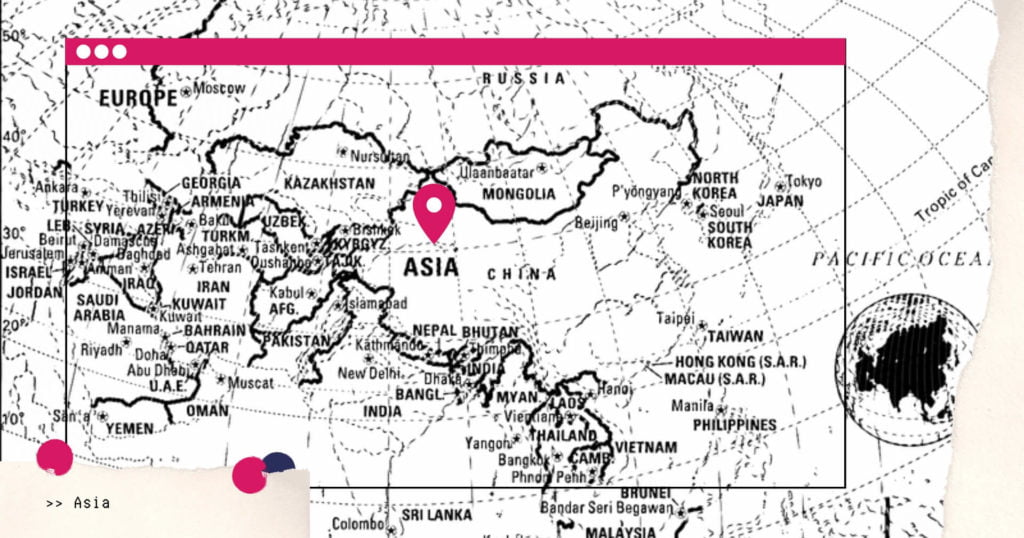
ASIA
01.02.21: China. BBC correspondent John Sudworth has left Beijing for Taiwan claiming he felt increasingly threatened from Chinese authorities. Sudworth’s coverage included reports of the harsh crackdown on the Uyghurs in Xinjiang province.
02.04.21: Taiwan. A train carrying approximately 500 people derailed in a tunnel in Hualien County after hitting a construction vehicle that had slipped onto the tracks. Over 50 people died in the accident and many more have been injured.
03.04.21: Jordan. Hamzah bin Hussein, the former Crown Prince and half-brother of King Abdullah II, has been arrested in what he claims is a crackdown on critics. The widow of the late king defended her son Hamzah, calling the allegations against him “wicked slander”.
03.04.21: India. Over 20 security personnel were killed and many more injured in a counter-attack by Maoist insurgents in Sukma district in the central State of Chhattisgarh.
04.04.21: Indonesia. Scores of people have died in flash floods that have affected much of the country.
04.04.21: Timor-Leste. Torrential rains have caused devastation in large parts of the country, including the capital Dili. Several people have died in the floods.
07.04.21: Palestine. Washington announced that it would be providing $235 million in aid to the Palestinians. Two thirds will go to the United Nations Relief and Works Agency for Palestine Refugees in the Near East (UNRWA) which had its funding cut by the Trump administration. Israel reacted angrily criticising both the Palestinian authority and UNRWA accusing them of perpetuating the conflict.
07.04.21: Turkey. European Commission President Ursula von der Leyen was snubbed by President Erdogan at a high-level meeting when she was placed a considerable distance away on a settee, while Charles Michel, the European Council President was seated on an armchair close to the Turkish President. The faux pas has been interpreted in various ways, but may well just be another sexist move by Erdogan who pulled out of the Istanbul Convention designed to protect women from domestic violence on March 20.
12.04.21: Iran. The country has vowed to “take revenge” for a cyber-attack on its Natanz nuclear uranium enrichment site on April 11. Israel had not claimed responsibility, although the Israeli press is linking the attack to Mossad operatives.
13.04.21: Japan. Over a million tonnes of radioactive water from the damaged Fukushima nuclear plant will be released into the Pacific Ocean after years of deliberation because concerns around safety and the negative impact on the marine environment.
17.04.21: Bangladesh. Police opened fire at workers protesting over unpaid wages, working hours and alleged discrimination killing at least five people and injuring many others. The incident happened in a Chinese-backed power plant in the southeast of the country.
17.04.21: Pakistan. Prime Minister Imran Khan called on the West to outlaw the insulting of Mohammed in the same way as it has Holocaust denial. Protests against France’s stance on the issue have been so intense that social media was suspended for a while throughout the country.
24.04.21: Armenia. As expected, Turkey and Armenia reacted very differently to US President Biden’s adopting the term “genocide” for the 1915 – 1917 ethnic cleansing of around one million Armenians living in the Ottoman Empire. Turkey insists on referring to the slaughter as “civil war casualties”.
24.04.21: Iraq. A poorly stored oxygen cylinder exploded in a Baghdad hospital leading to a fire that killed scores of people.
25.04.21: Indonesia. The submarine that went missing off the coast of Bali on Wednesday has been located and all 53 crew members confirmed dead. A day earlier the Navy concluded that the vessel must have sunk and cracked open since items belonging to the vessel had been found.
25.04.21: Armenia. Prime Minister Nikol Pashinyan announced his resignation, paving the way for early elections on June 20.
29/30.04.21: Israel. At least 44 people have been killed while others have been injured in a crush at the Lag B’Omer celebration, which takes place annually at the foot of Mount Meron.
30.04.21: India. The country’s health system has reached a saturation point as the Covid-19 crisis is spiralling out of control as new cases and variants of the virus are spreading relentlessly.
30.04.21: Kyrgyzstan / Tajikistan: Over a dozen people have been killed and many more have been injured after clashes for water in a disputed border area. About 10,000 people had to be evacuated for their safety.
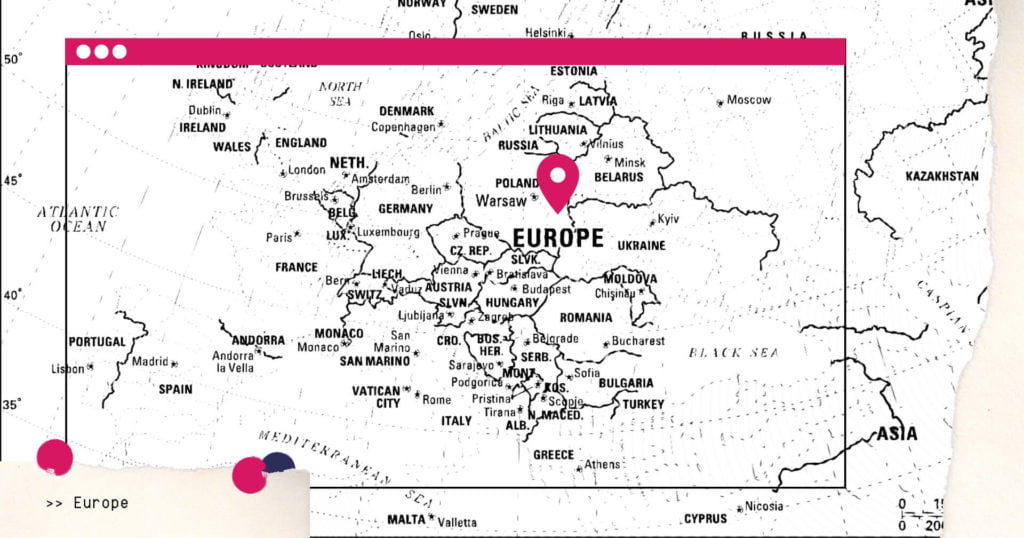
EUROPE
02.04.21: Ukraine. President Volodymyr Zelenskiy said that he received reassurances from President Biden that the US would stand by Ukraine in the face of ongoing Russian aggression.
O4.04.21: Kosovo. Despite an opposition boycott, Vjosa Osmani has received enough votes to become the country’s president. She had taken over from President Hashim Thaci in November when he resigned in order to face war-crime charges at a special court in The Hague.
05.04.21: Bulgaria. Enough votes have been counted from the parliamentary elections held on the weekend to confirm that Prime Minister Boyko Borisov’s centre-right party has come first. He will have serious problems forming a government as anti-corruption parties have ruled out joining a coalition with his tarnished GERB Party.
07.04.21. UK. Riots in Northern Ireland have reached a peak that has not been seen since the darker days of ongoing sectarian violence. Border issues following Brexit and a decision by the Public Prosecution Service not to prosecute any of the two thousand mourners who attended the funeral of a former IRA operative in June 2020, despite there having been coronavirus restrictions in place at the time, have been blamed for triggering the violence.
15.04.21. EU. Despite ongoing restrictions and coronavirus-related damage to the European economy, the €750 billion rescue package, which had been agreed by EU member States is still on hold. The process involves the ratification by all EU States of the required legislation for the borrowing mechanisms to begin, but as of today, ten States have still not done this.
17.04.21: Russia. 10 US diplomats were expelled from the country and eight top officials were blacklisted in retaliation for sanctions imposed by the US on Thursday. Meanwhile the Czech Republic expelled 18 Russian diplomats over a 2014 blast at an ammunition warehouse that has been blamed on Russia. In another blow to Putin, President Macron of France has called for “red lines” to be drawn in relation to Russia as backup to sanctions.
19.04.21**. Europe**. Twelve leading European football clubs announced the launch of a new Super League, which will comprise a closed group that would not involve relegated teams.
20.04.21: Russia. The US State Department has branded Russia’s naval build-up and plans to block parts of the Black Sea as “unprovoked provocation”. Meanwhile Russia is also intensifying its operations on Ukraine’s borders.
20.04.21: Germany. CPU leader Armin Laschet has been selected as the conservative coalition’s candidate for Chancellor in the federal elections due in September 2021.
21.04.21: Europe. In the wake of an uproar by fans, especially in the UK, most of the football clubs have withdrawn from the Super League crushing any hope of its survival.
23.04.21: Russia. Imprisoned opposition leader, Alexei Navalny, has announced that he would be ending his hunger strike that had been going on for over three weeks sparking serious concerns about his health.
27.04.21: Europe. The EU has filed a lawsuit against AstraZeneca over what it claims is a breach of contract that resulted in serious delivery delays.
28.04.21: UK. The First Minister of Northern Ireland, Arlene Foster, has resigned following a coup within her party. She is also stepping down as leader of the Democratic Unionist Party.
WORLD
17.04.21: COVID-19 deaths have officially passed three million.
23.04.21: The two-day climate summit organised by President Biden started today with many countries pledging to cut emissions by setting even tougher targets than those agreed with the 2016 ratification of the Paris Agreement.
May Quiz: Dinosaurs, The UN, May day celebration, an independent Scotland & ice cream!
By Ariana Yekrangi
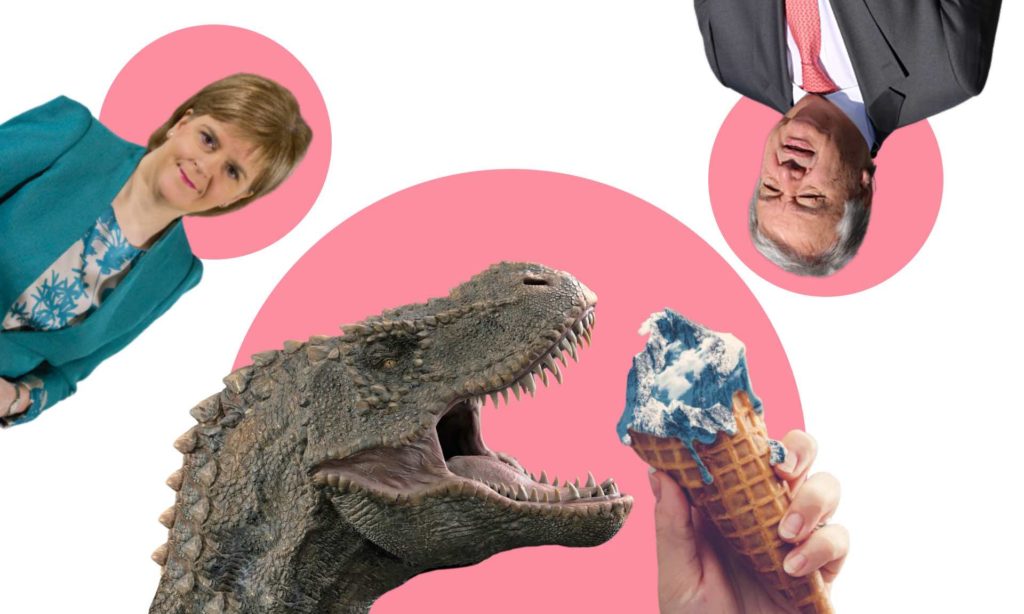
Photo by the UN-aligned design team/Flickr
Remember not to cheat and good luck!


